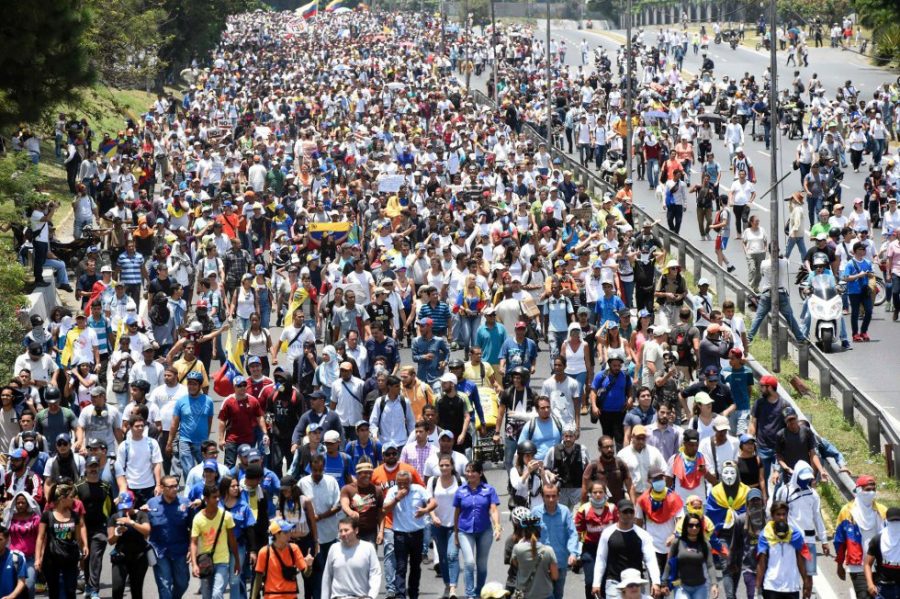At the end of the 1990s and during the first decade of the 2000s, Latin America lived a movement of political change, during which the neo-liberal democracies of the twentieth century leaned to the political left, and the word “privatization” became a taboo subject. A sense of ethnic identity grew as never before among the Latino community, and it was fed on hatred towards the Yankee Imperialism. These countries with a democratic socialist structure are unsurprisingly in deep economic disaster, like corrupted Brazil or the Venezuelan dictatorship that is ruled by cartels (of course there were countries that did achieve the Nordic system: see Uruguay, Costa Rica or Chile).
This movement is called the “pink tide.” Because of the quasi socialist policies (which is an ideology that is historically related to the red color), pink seemed appropriate to describe this lighter socialism. Beyond the discussion of the results seen in the Bolivarian continent, some Western and developed democracies have changed to follow populist leaders mainly from the right. To this movement, I will take the liberty of calling it the “Purple Tide”: where conservatism is the new name of fascism.
Following the First and Second World Wars (whose main causes were arguably nationalism and its consequences), European integration was needed to rebuild the continent, giving rise to what is now the political and economic system more influential in the world, second only to the United States. But it seems that the EU has failed its original mission lately; multiple political parties occupy seats on the European parliaments, the voices of hatred and irrationality are increasingly gaining strength, radicalism grows leaving a social humiliation (but not empirical) to the functional political theories, and all this is evidence of the lack of humanity’s memory.
First, we have the UK Independence Party and his president Paul Nuttall, the right-wing demagogues whose major achievement has been Brexit, the plebiscite in which UK announced to the international community that they will step out from the EU. Nuttall is a British Alt-Right deity, a climate change denier who believes scientists have politicized the issue, as stated in his open letter: “I think we all need to be assured about the credibility and motivation of scientists on board the global warming wagon.” Nuttall also supports the use of torture and wants to ban the burqa as a way to increase the ability of government surveillance. The Party’s Eurosceptic ideology led to the UK being the first country that will exit the EU. Nigel Farage, former president, used the fear of immigration and globalization as their main cards.
Second, we have the French party Front National (National Front), led by the daughter of the founder Jean-Marie Le Pen, Marine Le Pen. M. Le Pen has tried to give a softer image to the party after more than 40 years of alleged fascism principles, which has led her to expel many members, including her own father, due to polemic statements. Front National believes in anti-Euro policies and revival of the old French culture, seeking a common enemy in Islam, immigration, Americanization, the EU, and international free trade. France is in the eyes of the world due to the presidential elections that will be held in April (first round) and May (second round) this year. M. Le Pen has a good chance to defeat center left candidate Emmanuel Macron. This would be the second large victory of the Purple Tide.
Alternative für Deutschland (Alternative for Germany) is the far-right populist party that is growing in a slower proportion; Germany has 16 Federal States, and they have parliamentary representation in 10 of them. Although in the 2013 Federal Election the party just received 4.7 percent of the popular vote, it is possible that they will gain major power after the elections that will be held in September, as a consequence of the more than 1.5 millions refugees that the conservative Prime Minister Angela Merkel gave asylum to. The Left (self-explanatory) is another party that advocates for populist methods to gain votes. There is even an association with the Communist Platform who has the goal to end privatization and capitalism in the country. But on a general scale, these parties seem to have low representation, probably because of the history of Bach’s country that understands better than many that radicalism and authoritarianism lead to human misery, and the government should not only be measured by size but by shape as well.
In Spain, there is something curious: the fundamentalist right is extremely weak. There are many reasons that cause this, from the recent Franco dictatorship to the fact that most immigration is from Latin countries which have a similar culture, the same language and the same religion. Yet Spain has a left-wing populist party; Podemos (We can) opposes globalization and stands with protectionist policies. Its president Pablo Iglesias was a member of the Communist Youth Union of Spain in the 90s. Iglesias is a messianic figure for many young generations who are self-identified communists, and he symbolizes the overthrow of capitalism. Currently, Podemos has 59 of the 350 seats in the Congress of deputies and 20 of the 265 seats in the Senate. Although they aren’t able to achieve major law changes, they do seem to be increasing their power.
As a Western society, we must recognize the cultural legacy that is Greece, one of the countries that was most hurt in Europe due to the 2007 economic crisis; the debt impacted the life of every Greek, which made them tired of the establishment, along with the rough and inept EU. The power is currently held by the Synaspismós Rizospastikís Aristerás SYRIZA (Coalition of the Radical Left). SYRIZA has a platform similar to Podemos: they advocate for protectionism and the reduction of international free trade. The third most popular party is in the opposite side of the spectrum, the Chrysí Avgí (Golden Dawn), which stands with ultra nationalism, xenophobia, racism, misogyny, Islamophobia and Euroscepticism. This party is an actual threat to the Western values of freedom and equality. They already have power in 26 of the 725 regions in Greece, and just to make my point clear, let me show their flag, which may bring bad memories to many.

In the Netherlands, the Partij voor de Vrijheid (Party for Freedom) has made its own room in the Purple Tide, as one of the most radical institutions. The founder and leader Geert Wilders is a well-known, anti-Islam preacher; in his political manifesto “Clear Wine” published in 2006 he proposes to ban the Quran, close all the Mosques, and have a ban on Muslim immigrants, refugees, and anybody from a majority Muslim country (this is a good time to read V for Vendetta may I add). There was a general election held in the Netherlands on March 15, in which the Party for Freedom gained 20 seats in the House of Representatives, second place to the liberal People’s Party for Freedom and Democracy. The party also takes a stance against general immigration and the political establishment and as a solid Eurosceptic party that wants to follow the example of its neighbors and step out of the EU.
Movimento 5 Stelle (Five Star Movement) is a political party in Italy, founded by the comedian Beppe Grillo. They oppose the Eurozone and have declared a war on the press, in which many people in Italy have stopped believing. The party (self-considered civil institution) is not in a specific realm of the political compass, yet they do believe in ending the political establishment and renewing Italy. They sell themselves as the last hope of the Peninsula.
Last but not least is the Freiheitliche Partei Österreichs (Freedom Party of Austria), which recently lost the presidential election in 2016; however, it was by a small margin. Their candidate Norbert Hofer obtained 46.2 percent of the votes, losing to Alexander Van der Bellen, a centre-left candidate who gives full support to the EU. Hofer supports leaving the EU, as the Freedom Party is restrictive against immigration and hostile towards Islam. Their history cycles back to the 50s when they were founded by Anton Reinthaller, a former Nazi. Although they lost their last elections, they (along with the rest of the parties in this list) have an increasing number of supporters.
Humanity has a poor memory. Fascist speech is attractive to a society that threatens to overthrow the establishment of the social hierarchy. There are many more parties like these, in which Chauvinism and xenophobia are part of their political agenda. Voting is a human right, and like every right, it comes with a responsibility–to elect the most realistic, honest, congruent and tolerant candidates..if not for us, at least for future generations.












